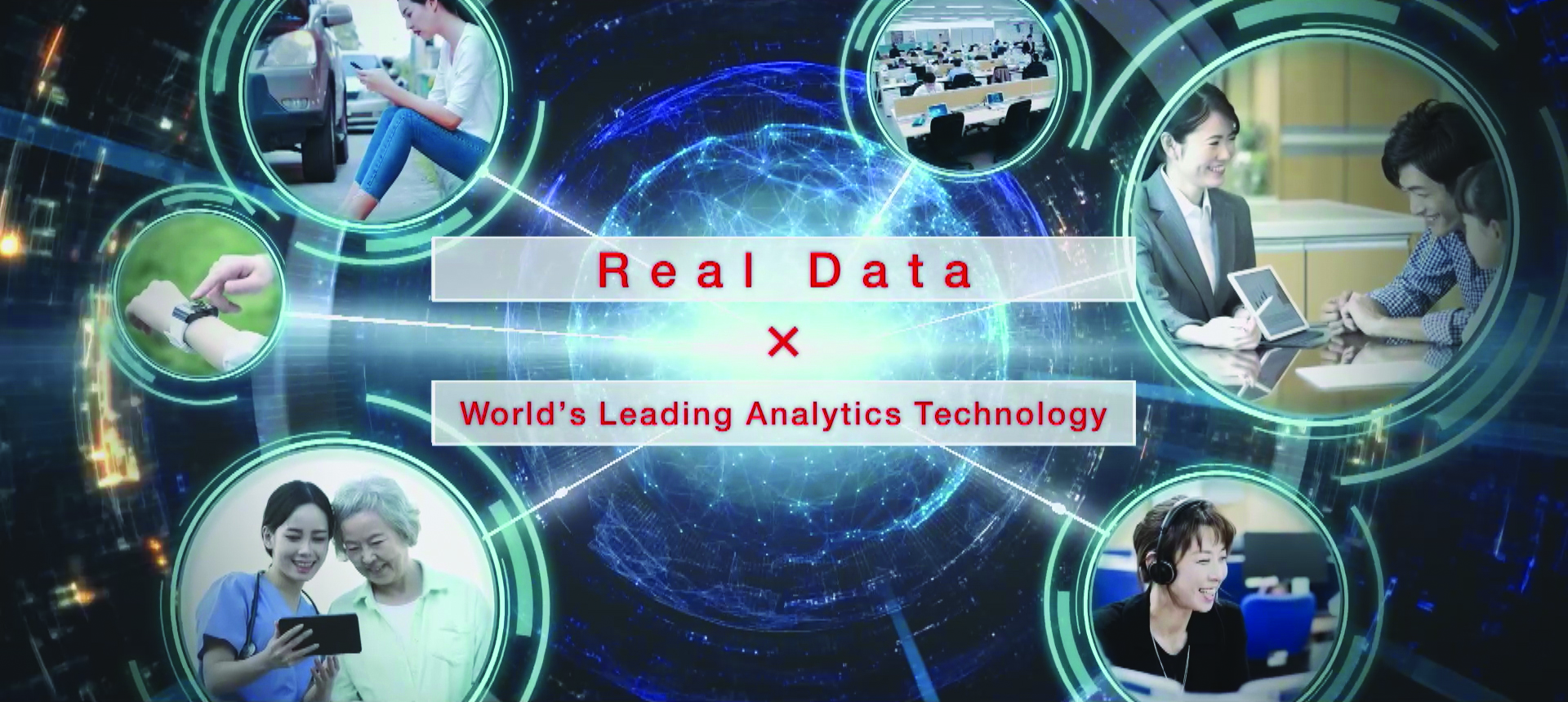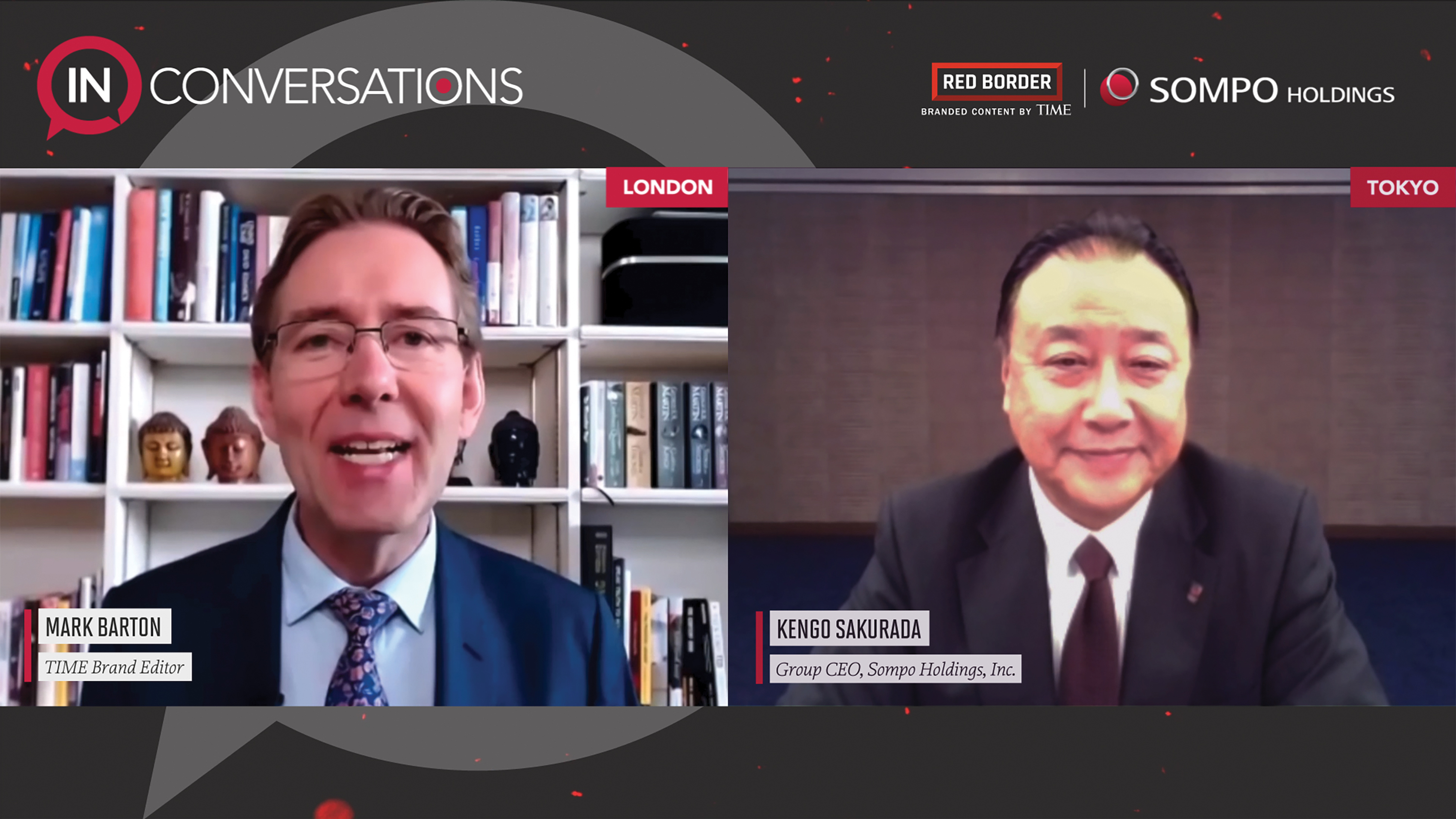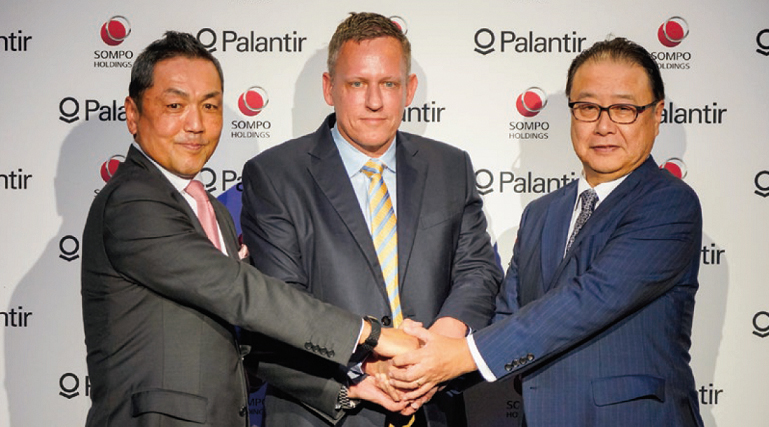CONTENT FROM SOMPO HOLDINGS
Digital evangelist Kengo Sakurada believes SOMPO’s real data platform can provide a foundation for sustainable solutions to society’s challenges.

Kengo Sakurada believes business must be a force for change. The Group CEO of SOMPO Holdings, one of Japan’s largest insurers, Sakurada recently published his first book Bushido Capitalism: The code to redefine business for a sustainable future. In its pages he proposes that the virtues and moral precepts of Bushido, the code of Japan’s Samurai warriors, offer a pathway to a more responsible, socially conscious and ultimately sustainable brand of capitalism.
Before setting out to change capitalism, however, Sakurada set about changing his own company. The 65-year-old chief executive is determined to transform SOMPO from a traditional insurer into a theme park for security, health and wellbeing. Sakurada’s theme park is a venue that delivers real and tangible solutions, innovations and improvements to the lives of its customers and to the broader society.
Creating real solutions requires real data, and SOMPO, from its insurance and nursing care businesses, possesses a treasure trove of that increasingly valuable raw commodity. The company has been developing its signature Real Data Platform, in which it partners with other advanced technology firms to analyze the information and create predictive models that Sakurada believes can be used to help prevent accidents, loss, illness and disease. By doing so, it will help to build the security, health and wellbeing that everyone seeks. In a continuing series of conversations with leaders who are building a better future, TIME Brand Editor Mark Barton sat down with Sakurada to explore the role of business in a sustainable future.

Watch the full interview here.
Barton: In your book Bushido Capitalism, there’s an episode that occurred in Davos, at the World Economic Forum in 2019. You say you had an awakening when you met a certain young Swedish environmental activist. Why was meeting Greta Thunberg such a significant moment for you?
Sakurada: I have to tell you that I didn’t know who she was at all. After the panel discussion among us, she made a very energetic speech. She said that all of you are knowingly sacrificing priceless treasures and the future of humankind just to make money. I felt ashamed that I had not known about her. That such a young girl could have such great energy to change the world was a real shock to me.

Barton: Also in your book, you write that in the corporate world the word “purpose” has taken on an unhelpful air of jargon. But, you do mention it a lot, so let’s discuss SOMPO’s purpose.
Sakurada: We really had to work to define the purpose of this company. And yet, our purpose is simple. We are not just an insurance company. We want to be a theme park for the security, health, and wellbeing of our customers, the people of the world. We want to allow people to live happily and healthily until their last day.
This philosophy is in line with Bushido, the moral principle of samurai, who knew any day could have been their last day. Bushido tells us how to live to achieve a beautiful death. Then I would like to highlight “Pin-Koro” in Japanese. Essentially, it means that if you do the right things to create a happy or beautiful life, you will be at peace when your time comes to pass. This will have a great impact on sustainability within society.
Barton: An insurer reframing itself as a theme park is something new. Why did you make the transformation to this theme park for security, health and wellbeing?
Sakurada: A traditional insurer, what we have been for 130 years, comes in at the last point, when people have experienced loss or damage. They don’t want to be thinking about loss or illness every day or minute. What our customers want to think about is how to be happier, how to be healthier, how to be more secure.
In my definition, a theme park transforms abstract things, such as dreams or beautiful images, into reality. We are seeking to transform the abstract concepts of security, health and wellbeing into things that are tangible, something our customers can feel.
Barton: In your book you call yourself a digital evangelist. You love technology. That brings me to how SOMPO uses its real data. How do you turn it into a valuable resource?
Sakurada: We are an owner of great amounts of real data, information that originates in the real world, such as health or car accident data. This real data is completely different from the virtual data that you can collect from the internet. It is different in terms of quality, usage and sensitivity. By using that real data, we can, for instance, make the nursing care industry much more productive. On top of that, by employing great technology, such as that which our partner Palantir provides, we may be able to make our industry into something that doesn’t just embrace those needing care, but also makes their lives more predictable.
Barton: Why are partnerships, such as your collaboration with Palantir Technologies, so important to providing solutions to build this sustainable future?
Sakurada: Diversity is a source of innovation. When I attended the World Economic Forum, I engaged with people from diverse fields and backgrounds, ranging from environmental activists to professional musicians. All of these people were able to stimulate my thoughts and imagination to an amazing degree.
Now, the same applies to our Real Data Platform. We have plenty of real data from accidents or the nursing care business or disease. But the data we have is something like crude oil. We need new technology to make our crude oil into something much more usable for the future and for people. So we need partners with the right technology to refine our data to bring the benefits to people around the world.

Barton: You say in your book that real data is going to be as valuable as gold and crude oil in the decades to come. Do you really believe that?
Sakurada: I do believe that. In that way we can make our lives more predictable. How long you can keep that healthy life, happy life by changing your daily life?
Barton: How important is the issue of trust, the issue of privacy; that you are able to ensure that you can keep this data private?
Sakurada: That is a critical point: for us to be successful with our Real Data Platform, trust should be there. Fortunately, we started as an insurance company, which requires trust from the customer. Trust has to be motivated by something beneficial to the data provider, meaning our customer. The benefit is in terms of security, or in terms of health, of wellbeing: something that makes them happier.
Barton: Can you elaborate on the Real Data Platform: why it’s so important?
Sakurada: I would like to present two concrete examples on how we can approach social issues through our Real Data Platform. In Japan, the nursing care industry is one of the fastest growing industries. But, there is a huge gap in supply and demand of human resources. That gap is going to widen much more by 2040 so we need to attain productivity and quality. By using real data with great technologies, we can achieve these two objectives simultaneously. Additionally, we could come up with the model to predict customers’ health status.
Second, we have plenty of data on natural disasters and insurance. For instance, in 2019, severe typhoons hit Japan successively. All of this can be analyzed with a model that predicts if this area is hit by this size of a hurricane in September at two o’clock in the morning, what damage can be expected. But unless we have real data and technology, it’s not possible.
The reason we call it a platform is that we have plenty of data collected from different areas of business. The data collected from nursing care about dementia could be used for safe driving. And data from natural disasters could be used for predicting crop harvests. Otherwise, we just have a vertical business model. It can be transformed just by applying this technology.
Japan is a forerunner in terms of aging. Many other countries will face similar issues so if we are successful, Japan will be the model for expertise that can be exported to the rest of the world.
Barton: In the context of sustainability, what we can learn from COVID-19
Sakurada: I think COVID-19 can give us a lesson in terms of the importance of a platform for a sustainable future. A platform is an ecosystem, and an ecosystem naturally should be diversified. We need to have a platform where we can collaborate. Where we can exchange our knowledge, technology and data based on trust. We need to create a platform and we want to be the one.
Barton: How does SOMPO want to be perceived in 2030?
Sakurada: We want to be a company that cannot be defined with the current terminology. We want to be something new. We want to be a genuine theme park for the security, health and wellbeing of people. Without SOMPO, society cannot be sustainable – that is the status we want to achieve. I think we can do it if we stick to our purpose.
Barton: In your SOMPO Manifesto, which I encourage all our readers to take a look at, you write about thinking big and celebrating your inner rebel. Why is it so important to do that?
Sakurada: First of all, you can’t grow without a dream. And maybe you can say if you express your dreams you have a big mouth. I encourage having a big mouth. If you talk big, eventually you tend to behave big. You will show that you can back up what you say and make it a reality.
Barton: What would your advice be to the young Kengo Sakurada, the admittedly obstinate and rebellious young man searching for his path and purpose?
Sakurada: You need to have your own thoughts, your own focus, your own story that foretells the future of your life. So my advice to young people is you have to be able to think for yourself, and you have to have a big mouth. But make sure you have a range of wisdom learned from classics like Bushido.
*This interview has been edited for length and clarity
- Why Trump’s Message Worked on Latino Men
- What Trump’s Win Could Mean for Housing
- The 100 Must-Read Books of 2024
- Sleep Doctors Share the 1 Tip That’s Changed Their Lives
- Column: Let’s Bring Back Romance
- What It’s Like to Have Long COVID As a Kid
- FX’s Say Nothing Is the Must-Watch Political Thriller of 2024
- Merle Bombardieri Is Helping People Make the Baby Decision